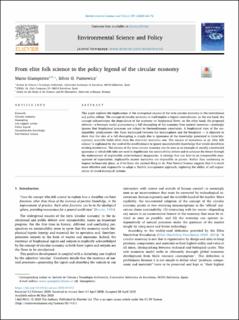| dc.contributor.author | Funtowicz, Silvio Oscar | |
| dc.contributor.author | Giampietro, Mario | |
| dc.date.accessioned | 2021-02-24T13:41:56Z | |
| dc.date.available | 2021-02-24T13:41:56Z | |
| dc.date.created | 2021-01-11T18:03:47Z | |
| dc.date.issued | 2020-07 | |
| dc.Published | Environmental Science and Policy. 2020, 109 64-72. | |
| dc.identifier.issn | 1462-9011 | |
| dc.identifier.uri | https://hdl.handle.net/11250/2730163 | |
| dc.description.abstract | This paper explores the implications of the widespread success of the term circular economy in the institutional and public debate. The concept of circular economy in itself implies a logical contradiction: on the one hand, the concept acknowledges the dependence of the economy on biophysical flows; on the other hand, the proposed solution—a business model guaranteeing a full decoupling of the economy from natural resources—seemingly ignores that biophysical processes are subject to thermodynamic constraints. A biophysical view of the sustainability predicament—the flows exchanged between the technosphere and the biosphere — is depicted to show that the idea of a full decoupling is simply due to ignorance of the knowledge generated in (inter)disciplinary scientific fields other than the dominant economic one. The success of economics as an ‘elite folk science’ is explained by the need of the establishment to ignore uncomfortable knowledge that would destabilize existing institutions. The success of the term circular economy can be seen as an example of socially constructed ignorance in which folk tales are used to depoliticize the sustainability debate and to colonize the future through the endorsement of implausible socio-technical imaginaries. A strategy that can lead to an irresponsible management of expectation: implausible master narratives are impossible to govern. Rather than continuing to impose technocratic plans, as if we knew the optimal thing to do, Post-Normal Science suggests that it is much more effective and responsible to adopt a flexible management approach, exploring the ability of self-organization of social-ecological systems. | en_US |
| dc.language.iso | eng | en_US |
| dc.publisher | Elsevier | en_US |
| dc.rights | Navngivelse 4.0 Internasjonal | * |
| dc.rights.uri | http://creativecommons.org/licenses/by/4.0/deed.no | * |
| dc.title | From Elite Folk Science to the Policy Legend of the Circular Economy | en_US |
| dc.type | Journal article | en_US |
| dc.type | Peer reviewed | en_US |
| dc.description.version | publishedVersion | en_US |
| dc.rights.holder | Copyright the authors | en_US |
| cristin.ispublished | true | |
| cristin.fulltext | original | |
| cristin.qualitycode | 1 | |
| dc.identifier.doi | https://doi.org/10.1016/j.envsci.2020.04.012 | |
| dc.identifier.cristin | 1869345 | |
| dc.source.journal | Environmental Science and Policy | en_US |
| dc.source.40 | 109 | |
| dc.source.pagenumber | 64-72 | en_US |
| dc.source.volume | 109 | en_US |

